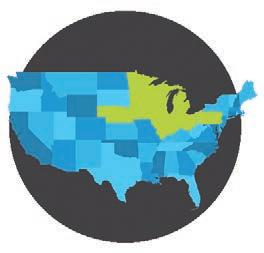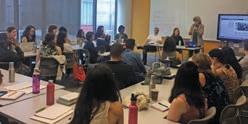
5 minute read
humanities Without Walls
the last year has been an interesting one, filled with challenges and trials that will shape research and graduate education for the coming decade and beyond, in ways anticipated and otherwise. as humanities Without Walls (hWW) enters this next decade, we anticipate facing these challenges with the collaborative methodologies we have developed and insights we have gained. thanks to the ongoing generosity of the andrew W. mellon Foundation, we recently received $5 million in funding that will support our efforts for another five years as we expand our experiments in graduate career development into virtual spaces and bring a heightened awareness of the scourge of anti-Black racism to all our myriad efforts.
reflecting on the last six years, it is clear that hWW’s efforts have always included an implicit awareness of these challenges and of the inequitable ways in which they are distributed across our society. two-time hWW grand research challenge PI rachel havrelock and her collaborator Kathleen Blackburn made this point in their February 25, 2020 essay in Belt Magazine: “humans experience distinct forms of waste whose toxicity varies according to race and social class. the wealthier you are the less waste you confront, despite the fact that you likely generate more through higher levels of consumption.” another hWW PI, Patrick Jagoda, was selected for a 2020 guggenheim Fellowship in the humanities in part because of his multidisciplinary research on histories of violence and futures of health on chicago’s south side.
Advertisement
our summer 2019 Pre-doctoral career diversity Workshop has already had an impact on its participants, as several of them have gone on to tenure-track faculty positions, mellon/acLs dissertation completion Fellowships, and prestigious postdocs. Fortuitously we did not have a summer workshop scheduled for the summer of 2020, and so there were no emergency Zoom meetings to work out last-minute alternatives in the wake of the coVId-19 pandemic and its cancellation of the quotidian details of daily life we had heretofore taken for granted.
hWW is presently rethinking every aspect of our workshops. given that collaboration is at the heart of humanities Without Walls, we plan to survey our fellows and research partners so that we can adapt our approaches as we move into “the new normal” of the third decade of the 21st century.
With this spirit of collaboration in mind, it is timely to note that key elements in the next hWW grand research challenge, and in the constitution of hWW itself moving forward, are the interrelated notions of “redistribution” and “reciprocity.” It is our intention that these powerful ideas will spur a host of innovations in collaborative humanities research, including more public-facing work, greater involvement of community partners, and increased funding of and collaboration with smaller, less well-resourced institutions of higher education. It is also our hope that these ideas will play whatever small part in constructing a more just and equitable society for all of us.
We have also recognized that career development in graduate education is a domain that current faculty do not feel adequately prepared to address, given their own lack of expertise in the area, and so hWW plans to develop short, intensive workshops for faculty and staff in the humanities that will allow us to share the lessons we have learned, reveal unforeseen challenges and opportunities and provide space for long overdue conversations.
as always, we encourage you to visit our website, humanitieswithoutwalls.illinois.edu, to learn more about our Fellows and our research projects.
MellON GRaNT ReNeWS CONSORTIuM, exPaNDS MeMbeRSHIP
In June, the university of Illinois was awarded a $5 million, five-year grant renewal from the andrew W. mellon Foundation for humanities Without Walls. “the decision by the mellon Foundation to award the renewal of the humanities without Walls initiative represents the ultimate vote of confidence in our humanities (left) career diversity Workshop 2019 (right) andreea micu, antoinette Burton, megan stielstra, and Jason mierek. research Institute,” said chancellor robert J. Jones. “hrI has been the headquarters of this program since its beginning and we’re very proud to have it remain here. this is a powerful testament to the institute’s national impact and leadership in cross-institutional cooperation and innovative humanities research practices.” the five-year grant renewal includes the addition of marquette university to the consortium and a number of initiatives guided by the core values of reciprocity and redistribution. “embedding reciprocal structures and practices in diverse and inclusive intellectual projects is key to the longrange transformations of academic culture in the humanities to which hWW aspires,” said hrI director and hWW principal investigator antoinette Burton. “this means modeling best practices of diversity and equity through collaboration and interdisciplinarity not just at scale, but by design—purpose-built to address contemporary challenges not only with knowledge, but with methods aimed at changing how we think about and do the work in the world for which humanists are urgently needed.” the renewed grant provides increased funding to research teams and supports the continuation of summer workshops for pre-doctoral humanities students that began in 2015. since its inception, hWW has awarded 39 unique research grants to teams in the consortium and graduated more than 140 students from the annual career diversity workshop. While the newest research initiative will be themeless, the first two initiatives were themed as “the global midwest” and “the Work of the humanities in a changing climate.” university of Illinois history Professor John randolph is principal investigator on the climate-related team “the classroom and the Future of the historical record,” which includes members from the university of nebraskaLincoln and michigan state. through this initiative, faculty and students are exploring the challenge of adapting the practice of history for the digital age. In addition to developing data science skills, participants are working on a program in digital documentary publishing called sourceLab. “having humanists from multiple institutions share ideas and conduct related initiatives over a period of time makes it possible to think broadly about big problems,” said randolph. “rarely do individual departments or universities have the kind of resources it takes to seed that kind of work. through hWW, it’s possible to chart out new directions by involving students in the exploring.” In addition to the university of Illinois at urbana-champaign, the humanities Without Walls consortium includes 15 other institutions that belong to the Big ten academic alliance—Indiana university, newest partner marquette university, michigan state university, northwestern university, ohio state university, Penn state university, Purdue university, as well as the universities of chicago, Illinois at chicago, Iowa, michigan, minnesota, nebraska and Wisconsin-madison—plus the university of notre dame. the consortium was initially funded in 2014 with a $3 million grant from the mellon Foundation and was renewed in 2016 with an additional $4.2 million.








